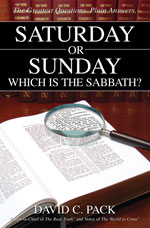 Getty Images
Getty Images
Article
Exodus 31 says it was a sign between God and the Israelites. What about us?
Learn the why behind the headlines.
Subscribe to the Real Truth for FREE news and analysis.
Subscribe NowThe Sabbath is one of the most revealing commandments in the Bible. It identifies who God is and who His people are today. Our Creator commands one day each week to be set apart, a vivid contrast to all the other days.
But who is the Sabbath for? Should it still be observed and kept? Some believe it was made exclusively for ancient Israel or for the Jews.
In Exodus 31, God said, “The children of Israel shall keep the Sabbath, to observe the Sabbath throughout their generations, for a perpetual covenant. It is a sign between Me and the children of Israel forever: for in six days the Lord made heaven and earth, and on the seventh day He rested, and was refreshed” (vs. 16-17).
This passage clearly states that the children of Israel were commanded to keep the Sabbath forever. Yet other scriptures show there is more to understand.
In the New Testament, Jesus Christ said, “The Sabbath was made for man, and not man for the Sabbath: therefore the Son of man is Lord also of the Sabbath” (Mark 2:27-28).
“Man” refers to all humanity. Jesus stressed that the Sabbath was made for everyone. It was meant for us to rest, be refreshed and spend time with God. Christ did not say it was made for Israel or for the Jews.
How can these two passages both be true?
The Sabbath was given to ancient Israel but also to all mankind. It is still a covenant and gift for God’s people now.
Plain Origin
When did the Sabbath come into existence? To find out, we have to look earlier than Exodus 31. In the book of Genesis, the Sabbath completes what has been referred to as the Creation Week.
Chapter 2 says, “And on the seventh day God ended His work which He had made; and He rested on the seventh day from all His work which He had made. And God blessed the seventh day, and sanctified it” (vs. 2-3).
God sanctified the seventh day before there were any nations on the planet—long before the man named Israel or his son Judah, from whom the Jews descended, came into existence.
That day was so important to God that He later made it the Fourth Commandment: “Remember the Sabbath day, to keep it holy. Six days shall you labor, and do all your work: but the seventh day is the Sabbath of the Lord your God: in it you shall not do any work, you, nor your son, nor your daughter, your manservant, nor your maidservant, nor your cattle, nor your stranger that is within your gates: for in six days the Lord made heaven and earth, the sea, and all that in them is, and rested the seventh day: wherefore the Lord blessed the Sabbath day, and hallowed it” (Ex. 20:8-11).
The Sabbath was established over 2,500 years prior to God’s covenant with Israel in Exodus 31. From the beginning, He built the seventh-day rest into the pattern of everyday life.
A Sign for God’s People
Now that we have seen the Sabbath began long before Israel existed, what did it mean when God later gave it as a covenant sign?
In Exodus 31:13, God stated, “My Sabbaths you shall keep: for it is a sign between Me and you throughout your generations; that you may know that I am the Lord that does sanctify you.”
Let’s break this down. The religious-sounding word sanctify simply means to set apart for a holy use. A covenant is an agreement between two parties—like signing a contract. The Sabbath was a sign identifying Israel and setting them apart for God’s special purpose.
God had to reveal to ancient Israel that the Sabbath was holy time. At the time of the Exodus from Egypt, Israel had just spent almost two centuries in slavery. They had long forgotten the identity of the true God and His Sabbath day.
The Sabbath was illustrated to them when God sent bread from heaven called manna for six days, but not on the seventh day. Read Exodus 16 for the full story. God told Moses to instruct the people to gather double on the sixth day of the week, then rest on the seventh day Sabbath and not do any physical labor. God took special care to teach this physical nation the spiritual value of keeping the day.
Israel was meant to be a model nation—an example showing that God blesses those who obey Him. By watching Israel, other nations would learn about the true God and His laws.
The Sabbath did not begin with Israel and it does not end with this nation. The Sabbath is a sign that still identifies and sets apart those who belong to God today.
The Sabbath in the New Testament
The New Testament clearly shows that Jesus observed the Sabbath when He walked the Earth. Christ knew exactly which day the Sabbath was—and He kept it faithfully.
Luke 4:16 says, “And He [Jesus] came to Nazareth, where He had been brought up; and, as His custom was, He went into the synagogue on the Sabbath day, and stood up for to read.” Jesus taught, preached and healed on the Sabbath.
Jesus Christ is the example that anyone who wants to obey God must follow. Read I Peter 2:21. He led a perfect, sin-free life.
He kept the Fourth Commandment, and all the commandments, perfectly through His entire lifetime. He never told anyone to stop keeping it or that it was only for the Jews. Jesus tied Himself to this day directly, saying in Luke 6:5 that “the Son of man is Lord also of the Sabbath.”
The early Church continued the same pattern. Acts 13:42-44 shows the apostles Paul and Barnabas taught on the Sabbath day. The passage shows they were teaching the truth to Gentiles—non-Israelites.
In Hebrews 4:9, Paul said, “There remains, then, a Sabbath-rest for the people of God” (New International Version). God expects all of His people, regardless of their background, to observe the Sabbath rest.
Reading the rest of Hebrews 4 shows that the weekly Sabbath points to a prophetic future time of rest for those who belong to God. This future rest represents the time when all humanity will be freed from sin under God’s Kingdom.
This is why those who follow Christ—then and now—continue to keep the Sabbath.
God’s People Today
Who are God’s people today? Even as Israel was delivered from Egypt so they could worship God, individuals today have been called out of a sinful world to worship God and obey His commandments. John 6:44 explains that the Father draws people to Jesus Christ.
Being descended from Israel does not set a person apart—obedience does.
God did make a special Sabbath covenant with Israel and the Jews. But it applies to Christians today as well. Romans 2 says, “A true Jew is one whose heart is right with God. And true circumcision is not merely obeying the letter of the law; rather, it is a change of heart produced by God’s Spirit. And a person with a changed heart seeks praise from God, not from people” (vs. 29, New Living Translation).
Anyone who obeys God, regardless of background, is a spiritual Jew.
Galatians 6:16 supports this, saying of those who follow God’s commands: “Peace and mercy to all who follow this rule—to the Israel of God” (NIV).
What defines being a follower of Christ is obeying the laws of God. And the most visible commandment that sets a person apart from others is the Sabbath. It identifies those who worship God.
A Command That Still Applies
The truth matters to God, and it should matter to us. The Sabbath is not only about a requirement to observe the right day, but about being in harmony with our Creator.
The Fourth Commandment is tied directly to God’s identity. God states that the Sabbath identifies Him and reminds His people of who He is (Ezek. 20:12). It is a weekly reminder of the Creator—the God who made heaven and earth in six days and rested on the seventh.
The Sabbath was not just for ancient Israel—it is for all mankind. This special day was given at Creation to complete the weekly cycle. God preserved it through Israel’s history.
Jesus faithfully observed the Sabbath and made it central to His life and ministry. If you want to follow Christ, consider keeping the same day He did. The apostles and the early Church observed it, and it is still in force today.
Isaiah 58 shows that those who keep the Sabbath will be blessed by God: “If you turn away your foot from the Sabbath, from doing your pleasure on My holy day; and call the Sabbath a delight, the holy of the Lord, honorable; and shall honor Him, not doing your own ways, nor finding your own pleasure, nor speaking your own words: then shall you delight yourself in the Lord; and I will cause you to ride upon the high places of the earth, and feed you with the heritage of Jacob your father: for the mouth of the Lord has spoken it” (vs. 13-14). If you observe the Sabbath, you can lay hold on these blessings too.
To learn more, read our book Saturday or Sunday – Which Is the Sabbath? It explains how you can know whether the weekly Sabbath is Saturday or Sunday, how to properly keep it, and many other questions that may be on your mind.



